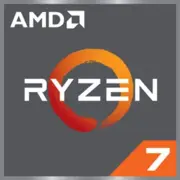AMD Ryzen 7 PRO 4750GE

AMD Ryzen 7 PRO 4750GE: Compact Power for Work Tasks and Beyond
Analysis of the Processor in the Market Conditions of 2025
Key Specifications: Zen 2, 7nm, and Hidden Potential
The AMD Ryzen 7 PRO 4750GE processor, released in 2020, remains in demand in 2025 due to its unique combination of features.
- Architecture and Process: Based on the Zen 2 microarchitecture, manufactured with a 7nm (TSMC FinFET) process. Despite its age, the technology ensures high energy efficiency with a TDP of only 35W.
- Performance: 8 cores and 16 threads with a base frequency of 3.1 GHz and a maximum of 4.3 GHz. In the Geekbench 6 test, it scores 1514 points (single-core) and 6350 (multi-core), comparable to modern mid-range 6-core CPUs.
- Key Features:
- Integrated Radeon Vega 8 graphics (8 cores, up to 2000 MHz) — sufficient for office tasks and light gaming.
- Support for PRO technologies: AMD Secure Processor, Memory Guard for corporate security.
- Low power consumption: ideal for compact and silent systems.
Compatible Motherboards: AM4 and Selection Nuances
The processor uses the AM4 socket, which by 2025 is considered outdated but remains accessible.
- Chipsets: Optimal motherboards are those with B550, X570, or A520. For example, the ASUS TUF Gaming B550M-Plus (~$120) or budget-friendly Gigabyte A520M S2H (~$75).
- Features:
- Mandatory BIOS Update: Many motherboards released before 2023 require a firmware update for compatibility with Renoir.
- Absence of PCIe 4.0: Unlike Ryzen 5000/7000, it uses PCIe 3.0, which limits the speed of NVMe drives.
- Recommendation: Choose models with reliable VRM (even for 35W) and USB 3.2 Gen2 ports for current peripherals.
Memory: DDR4 and Speed Balance
The Ryzen 7 PRO 4750GE supports DDR4 up to 3200 MHz (Dual Channel mode).
- Recommended Modules: 2x8 GB DDR4-3200 (CL16), for example, Crucial Ballistix (~$55 for the set).
- Nuances:
- DDR5 is not supported, which appears to be a downside in 2025. However, DDR4 is cheaper and more accessible (16 GB DDR4 starting at $50 vs $80 for DDR5).
- High RAM frequency is crucial for APU – it boosts the performance of integrated graphics by 15-20%.
Power Supply: Minimum Watts, Maximum Reliability
With a TDP of 35W, this processor is not demanding on the power supply, but the choice depends on the configuration:
- System without a discrete graphics card: A power supply of 300-400W is sufficient (for example, be quiet! Pure Power 11 400W, ~$60).
- With a discrete GPU like the NVIDIA RTX 4060: A 550-650W power supply is recommended (Corsair CX650M, ~$80).
- Advice: Don’t skimp on certifications (80+ Bronze or better) — this guarantees long-term stability.
Pros and Cons: Who is the 4750GE Ideal For, and Who is it a Compromise For?
Pros:
- Energy efficiency: Suitable for mini-PCs (for example, ASRock DeskMini) and servers.
- Powerful iGPU: Radeon Vega 8 handles Full HD gaming on low settings (CS2 — 60–70 FPS, GTA V — 50–55 FPS).
- Multi-threading support: Rendering in Blender, video encoding in HandBrake.
Cons:
- No PCIe 4.0/5.0: SSD and GPU speeds are limited.
- Outdated AM4 socket: No upgrade to Zen 4/5 without replacing the motherboard.
- Competitors: Intel Core i5-13400T (12 cores, DDR5) offers better performance for $280.
Use Cases: Where the 4750GE Shines
1. Office PCs: Fast work with Office, browsers (50+ tabs), video conferencing.
2. Home Media Center: 4K streaming, HDR, low noise (running Ubuntu or Windows 11).
3. Light Gaming: Games like Dota 2, Minecraft, Overwatch 2 on medium settings.
4. Workstations: Virtualization (VMware), programming, graphic design in Photoshop.
Comparison with Competitors: Who Leads in 2025?
- Intel Core i7-13700T (14 cores, 20 threads, 35W):
- Pros: Higher performance in single-threaded tasks (~1700 in Geekbench 6), DDR5.
- Cons: Price — $320, lack of integrated graphics in the base version.
- AMD Ryzen 5 8600G (Zen 4, 6 cores, RDNA 3 iGPU):
- Pros: PCIe 5.0, support for DDR5-5600, modern architecture.
- Cons: More expensive (~$280), fewer cores.
Conclusion: The 4750GE excels in the budget segment (price ~$200–220), but falls behind in future-proofing.
Practical Assembly Tips
1. Motherboard: Choose models with HDMI 2.0 (for 4K@60Hz) and M.2 NVMe (for example, MSI B550M Mortar).
2. Cooling: Even the stock cooler will suffice, but for quieter operation, get a tower cooler like the Cooler Master Hyper 212 (~$35).
3. Case: Mini-ITX (Fractal Design Node 304) or compact mATX (Silverstone PS15).
4. Storage: Samsung 970 EVO Plus 1 TB (~$90) — a balance of speed and price.
Final Conclusion: Who is the Ryzen 7 PRO 4750GE Suitable For?
This processor is an excellent choice for:
- Offices and businesses: Reliability, security, low operational costs.
- Enthusiasts of compact builds: Mini-PCs for work and entertainment.
- Budget home systems: If high-end gaming or PCIe 5.0 isn’t required.
Price in 2025: New units — $200–250. Despite its age, the 4750GE remains a cost-effective option where cores, iGPU, and energy efficiency are important. However, for future upgrades, it is better to consider the AM5 platform or Intel LGA 1851.
Basic
CPU Specifications
Memory Specifications
GPU Specifications
Miscellaneous
Benchmarks
Compared to Other CPU
Share in social media
Or Link To Us
<a href="https://cputronic.com/cpu/amd-ryzen-7-pro-4750ge" target="_blank">AMD Ryzen 7 PRO 4750GE</a>